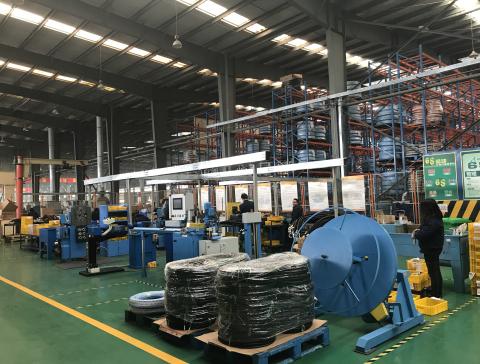what is the material of the PTFE hose?
Fluoropolymers are used to make PTFE hoses. They are often used in industrial and hydraulic applications. They feature excellent chemical resistance, which makes them suitable for a wide range of uses. These hoses are available in smooth, convoluted and braided designs and are also available with a full range of fittings and a variety of other features.
PTFE is a synthetic polymer material that is resistant to many acids and alkalis and is almost insoluble in any solvent. This makes it an excellent choice for pipeline corrosion resistance, lubrication, and so on. Its low friction coefficient makes it ideal for high-temperature applications.
PTFE is an engineered fluoropolymer with excellent chemical resistance and a wide temperature range. It is suitable for a variety of fluids and ambient temperatures, with only a small reduction in maximum working pressure required for higher temperatures. PTFE hoses are nonstick and have a low coefficient for friction. They are also approved for food use, making them a safe choice for applications requiring high temperatures.
There are many thicknesses of PTFE hoses. However, they all have the same inner core. Smooth bore hoses are easily crimped and swaged. For applications that require a medium-to-high-pressure hose, there is a single-ply PTFE hose available.
advantages and disadvantages of PTFE hose
Teflon or polytetrafluoroethylene hose is an excellent, flexible alternative to rubber hoses. PTFE, made from carbon and fluorine is resistant to a wide range of chemicals and temperatures. Its low friction and electrical insulation properties make it a versatile material widely used in many industries.
PTFE hoses do not react and will not contaminate the goods being transported. They are ideal for the pharmaceutical, dairy, and food industries due to their flexibility, low tensile stress, and high electrical insulation. Additionally, PTFE hoses exhibit excellent electrical resistance and a low dielectric constant (2.1 between -40 degrees F and 480 degrees F).
PTFE is a versatile material, but there are some drawbacks. One disadvantage is the high melting point of the material. It is not suitable for molding or calendering, and it does not perform well in cold flow. Its thermal conductivity is low which reduces its service lifespan.
The PTFE material is non-stick, and it is resistant to abrasion and corrosion. In addition, it is able to resist high temperatures and is largely insoluble in most solvents. It can also be easily modified for its intended purpose. However, a PTFE hose is a costly investment, so it's important to make sure it's the right choice for your application.
PTFE hoses are also very durable. It is important to take into account the material's resistance to temperature. Rubber is prone to breakdown when exposed to high temperatures, but PTFE is remarkably temperature resistant, making it an excellent choice for a variety of industrial applications.
Price range for PTFE hose
PTFE hoses are a great choice for chemical transfer, fluid handling, pharmaceutical applications, and other applications. These hoses can withstand temperatures between -65 and 450 degrees F. They can also be factory crimped.
PTFE hoses are the ultimate in hose material, exhibiting outstanding resistance to chemicals. They are also suitable for applications involving power steering, brake, and clutch fluids. PTFE hoses are extremely resistant to wear and shock. They are also great for tight spaces because they don't emit toxic fumes or vapours when they are exposed to chemicals.
There are many prices for PTFE hoses. Nuke Performance PTFE fuelhoses have a full flow design to minimize flow loss. The PTFE lining, unlike nitrile fuel hoses is highly effective at preventing fuel leakage. PTFE fuel hoses come in a variety sizes, from AN-6 to AN-12.
A typical PTFE hose is priced between $15 and $30. These hoses can be used in high pressure applications and are lightweight and durable. They are often used in industrial settings, and are resistant to hydraulic fluids, oil, and chemicals. They are also great for automotive sealants, reaction injection molding machines, and other hydraulic services.

